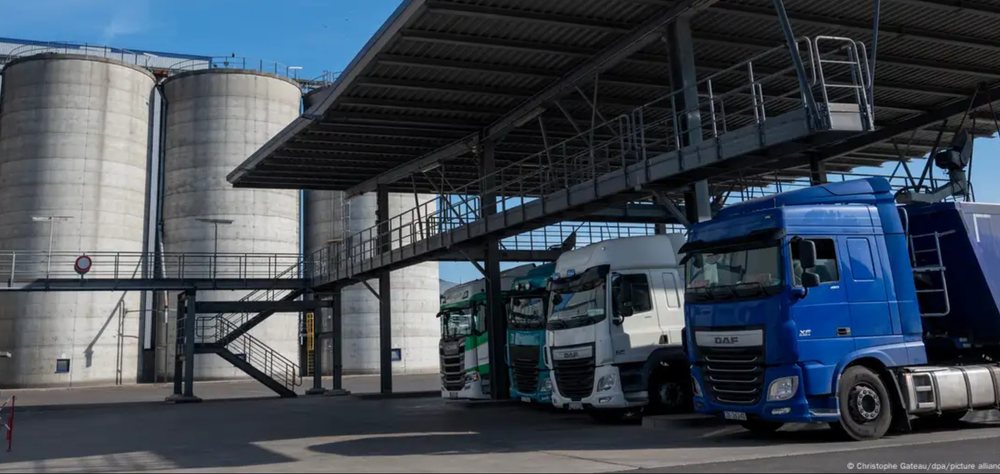
The bidder seemed serious, in 2023, the German company Verbio decided to invest in climate certificates from China. The offer came from the Chinese company Peking Carbon. The projects have already been approved and Verbio doesn't have to worry about anything else, Beijing Carbon promised.
"The company seemed very professional to us," says Stefan Schreiber, one of the company's board members. He is sitting in a conference room at the company's premises in Schwedt near Berlin, overlooking the industrial area. Tankers, tanks and pipelines pass by regularly.
Verbio is a biofuel producer that also markets CO2 certificates. In 2023, the German company won the rights to climate certificates from China. They came from a factory that uses waste gas to make oil. Otherwise they would simply dry up or burn.
Protecting the global climate
Certificates are issued in Germany. The idea is to encourage climate protection investors in oil and gas fields around the world with these investments. The Federal Environment Agency has already given approval. Schreiber thought the deal was beneficial. "It was a risk-free investment," he recalls. The offer was also very good.
Together with ZDF Frontal, the DW investigative team worked on the project's documentation, examined satellite images and spoke to well-informed people. According to our research, the Verbio project, with the file number BZIA, is most likely part of a big scam. By allowing only new systems to be adopted - Germany wants to ensure that additional climate protection is actually achieved.
Old system released as new
But we find many old systems presented as new climate protection projects. This is also the case with the BZIA project: a photo from 2019 shows that the system was completed a year and a half before the climate protection project was applied in Germany. It means that the completed system has applied for support as a new project.
The decision of Axel Michaelowa, a climate expert from the University of Zurich, to whom we showed the results of our research, is therefore clear: "This system should not be approved under any circumstances. It is not possible for completed systems to apply for support ".
A pattern we find in many projects: the old system is presented as a new project for climate protection. Most of the dubious projects apparently come from a Chinese company: Beijing Carbon specializes in emissions reduction and certificate trading.
The founder previously worked on energy issues in various leadership positions in the Chinese government and state-owned companies. She founded Beijing Carbon in 2011 with her son and several others.
Stefan Schreiber's project was also developed by Peking Carbon. which can be seen from the official project documents. Schreiber paid the Chinese company in installments, but cannot say exactly how much because of a confidentiality clause. Based on the documents, we estimate that around 25 million euros have been invested.
Were there any helpers in Germany?
The contracts and documents met professional standards, he says, "If there was any fraud, which we assume, then there must have been people in Germany who knew this system," he is convinced. "Otherwise it would not have been possible with this level of professionalism".
Some in the industry point the finger at inspection companies that are on record as having inspected the systems. The Federal Environment Agency does not inspect the projects itself, but bases its assessment on the work of private German testing companies. They work mostly independently.
In a letter from an industry office insider, doubts were expressed. The inspection companies, the authors write, "collaborated" with Beijing Carbon.
We have been unable to find any evidence of collusion. But there are many indications that testing companies have made serious mistakes. In one case, facility documents confirm six large gas storage facilities, although photos and satellite images clearly show only four are there. According to inspection reports, the company's inspectors have been on site seven times. "I think it is unlikely that the examiners were there," concludes Axel Michaelowa. "It's impossible not to see these warehouses."
Fraud with inspections?
Inspection companies in this case are quite popular. Muller-BBM Cert specializes in environmental reports. While Verico SCE is an even bigger name in the industry. One of the board members represented the interests of global testing companies before United Nations bodies for more than ten years. At least one of the two companies examined 48 of the 66 projects from China. "This should have been noticed", says Axel Michaelowa.
The companies deny the allegations. Verico SCE sees "no reason to doubt the quality of our professional work or the work of our auditors". Even Muller-BBM Cert is "convinced that there is no criminal behavior of employees in our company".
Now in Germany, the investigations into the allegations of fraud have started. The Federal Environment Agency wants to clear things up completely. New applications for the program will no longer be accepted. The State Prosecutor's Office has conducted checks on both companies. While the company from Beijing has not answered our questions. /DW (A2 Televizion)











